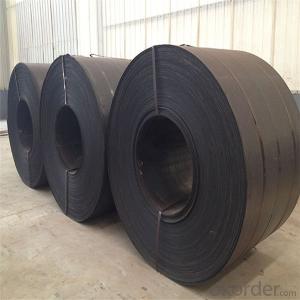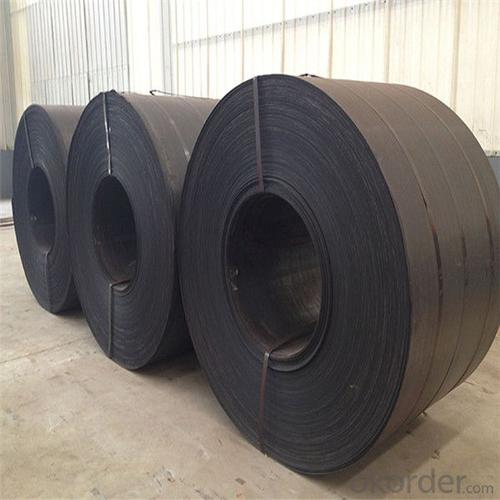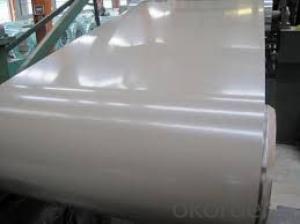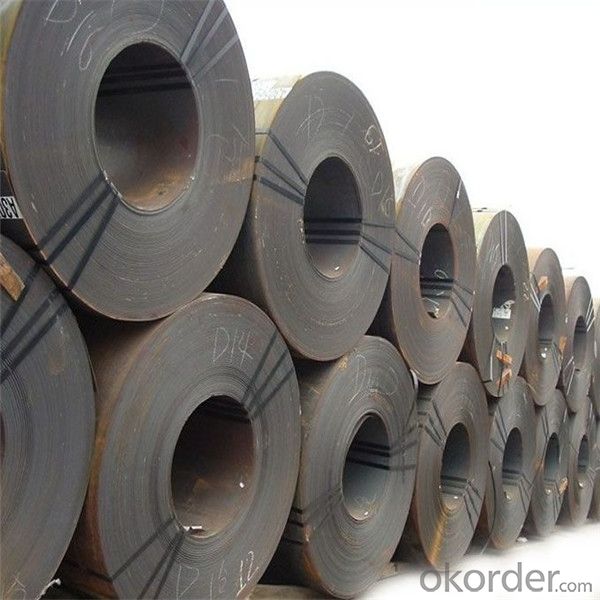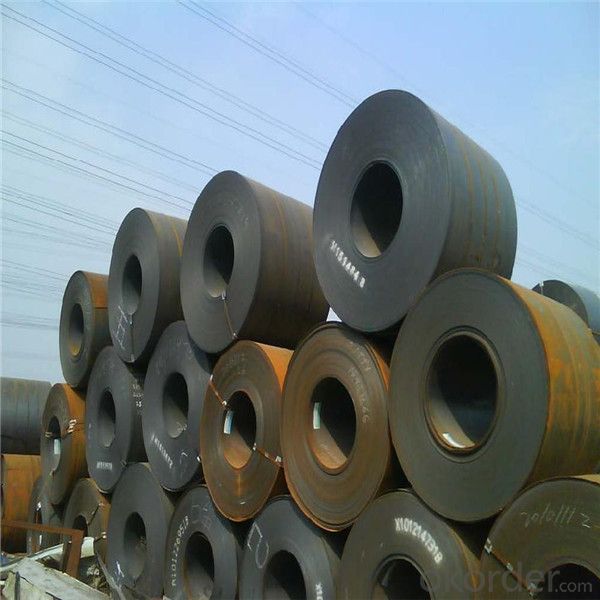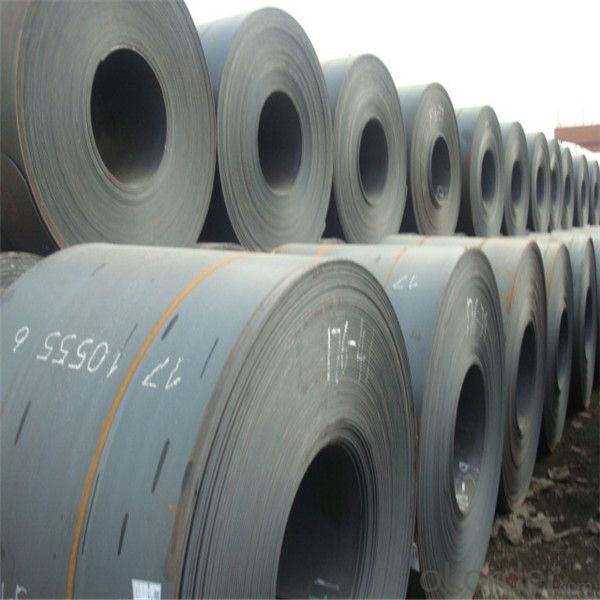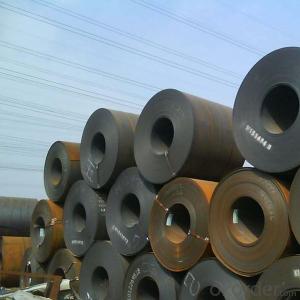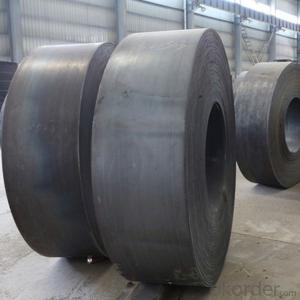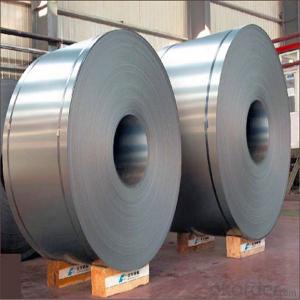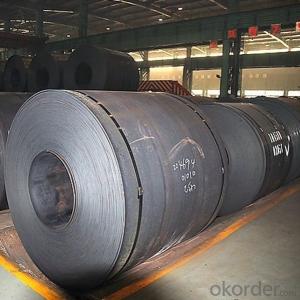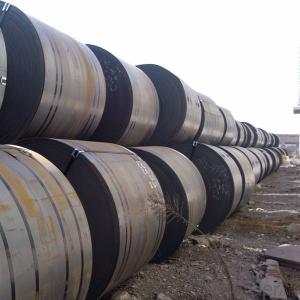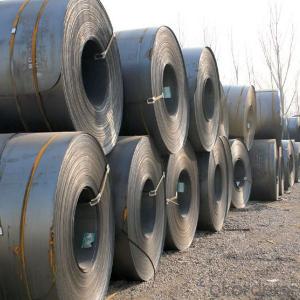Hot rolled steel coil SS400 from China hot sale
- Loading Port:
- Tianjin
- Payment Terms:
- TT OR LC
- Min Order Qty:
- 50 m.t.
- Supply Capability:
- 1000 m.t./month
OKorder Service Pledge
OKorder Financial Service
You Might Also Like
Specification
Hot Rolled SteelA rolling process at temperatures over 1,000 degrees Fahrenheit is use to create hot rolled steel. Steel products in Massachusetts that have been processed in this manner will have a blue-gray finish that feels rough to the touch.
Hot rolled steel actually reconfigures itself during the cooling process, giving the finished product looser
tolerances than the original material and when compared to cold rolled steel products. Hot rolled steel
is more malleable, allowing it to be forced into a variety of different shapes.
Standard and Grade :
Hot rolled steel coils | ||||
JIS | ASTM | SAE | EN | |
Commercial quality | G3131 SPHC | A569 A635 A659 A1011 CS Type A,B,C | 1006~1025 |
10111 DD11 |
Drawing quality | G3131 SPHD | 1006~1010 | 10111 DD12 | |
Deep drawing quality | G3131 SPHE | A622 A1011 DS Type A,B | 1006~1010 | 10111 DD13 DD14 |
General structure (T.S.<490N/MM2) | G3101 SS330 SS440 G3106 SM400A G3132 SPHT1 SPTT2 SPHT3 | A36 A283 GR.C A570 GR.30~40 A1001 SS GR.30~40 |
1010~1025 | |
General structure (T.S.≥490N/MM2) | G3101 SS490 G3106 SM490A SM490YA | A570 GR.45~50 A607 GR.45~70 A1011 SS GR.45,50 |
J1392 050X | |
|
Application :
Automobile Industry, electrical appliance, machinery manufacturing, container manufacturing, shipbuilding,
bridge, pipeline, and receive high acclaim from our customers for its excellent quality.
Packing:
Packaging Detail | The packing of coil consists of anti-damp paper ,PVC film ,hardboard paper , steel box , strapped with steel strips, fitted with locks and edge protectors and guarantees the optimal condition of the delivered goods. Each coil can be additionally fitted with wooden/steel skids(eye of the side) or wooden pallets(eye of the sky) |
Delivery Time | within 30 days of receipt of LC original or prepayment |
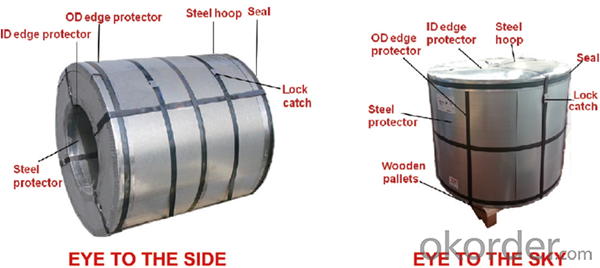
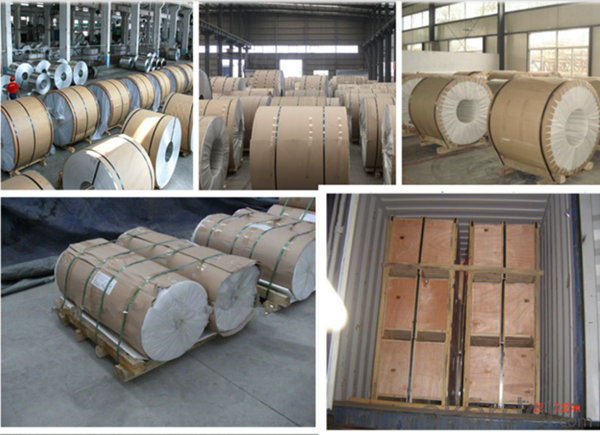
Our Services
MOQ | FCL, 25 metric tons per 20GP, can be assorted with different sizes. |
LCL for trial order is acceptable. | |
Price Term | EX-WORK, FOB China Port, CNF, CIF |
Payment | T/T, 30% advanced payment before production and balance before shipment; OR Irrevocable L/C at sight. |
Delivery Time | within 30 days of receipt of LC original or prepayment |
FAQ:
1. Can you offer OEM to me? What about MOQ?
Of course, we are a professional with OEM manufacturer for 9 years. the MOQ can be 50 ton/ order..
2. How to guarantee the quality of the products?
We have established the international advanced quality management system,every link from raw
material to final product we have strict quality test;We resolutely put an end to unqualified products
flowing into the market. At the same time, we will provide necessary follow-up service assurance.
3. How long can we receive the product after purchase?
Usually within thirty working days after receiving buyer’s advance payment or LC. We will arrange the
factory manufacturing as soon as possible. The cargo readiness usually takes 15-25 days, but the
shipment will depend on the vessel situation.
4.How Can I Get Some Sample?
We are honored to offer you free sample, but courier charges will be on your side.
- Q: What are the different types of steel coil surface coatings?
- There are several different types of steel coil surface coatings that are used to enhance the durability, corrosion resistance, and aesthetic appearance of the steel. Some of the commonly used coatings include: 1. Zinc Coatings: Zinc coatings are widely used to protect steel from corrosion. Galvanized steel coils are coated with a layer of zinc to provide a barrier against moisture and other environmental elements. 2. Galvannealed Coatings: Galvannealed coatings are a combination of zinc and iron. This coating provides enhanced corrosion resistance and also improves paint adhesion, making it suitable for applications where painting is required. 3. Aluminum Coatings: Aluminum coatings are used to provide a lightweight and corrosion-resistant surface. Aluminum-coated steel coils are often used in the automotive industry for body panels and other parts that require high strength and resistance to corrosion. 4. Organic Coatings: Organic coatings are typically applied as a layer of paint or powder coating. These coatings provide protection against corrosion and also offer a wide range of color options for aesthetic purposes. They are commonly used in the construction industry for roofing and cladding applications. 5. Metallic Coatings: Metallic coatings such as tin, nickel, and chromium can be applied to steel coils to provide specific properties like improved electrical conductivity, increased hardness, or enhanced resistance to wear and tear. 6. Ceramic Coatings: Ceramic coatings are used to provide high-temperature resistance and thermal barrier properties. They are often used in applications where steel coils are exposed to extreme heat or in industrial processes that require thermal insulation. Each type of coating has its own unique properties and advantages, and the choice of coating depends on the specific requirements of the application. Manufacturers and engineers carefully consider factors such as cost, durability, corrosion resistance, and aesthetic appeal when selecting the appropriate coating for steel coils.
- Q: What are the common applications of stainless steel coils?
- Stainless steel coils possess unique properties and characteristics that allow for a wide range of applications. Some of the most frequently seen uses for stainless steel coils include the following: 1. Automotive industry: The automotive industry extensively incorporates stainless steel coils in the manufacturing of components such as exhaust systems, mufflers, and catalytic converters. These applications benefit from stainless steel's corrosion resistance and durability, making it an ideal choice. 2. Construction industry: The construction industry heavily relies on stainless steel coils for structural elements, roofing, cladding, and facades. Stainless steel's high strength, resistance to corrosion, and aesthetic appeal make it a popular choice for architectural projects. 3. Kitchen appliances: Stainless steel coils are commonly utilized in the production of kitchen appliances like refrigerators, stoves, ovens, and dishwashers. Stainless steel's easy cleanability, resistance to heat and stains, and hygienic properties make it the preferred material for these applications. 4. Food processing industry: The food processing industry widely employs stainless steel coils for equipment such as tanks, pipes, and conveyor systems. Stainless steel's corrosion resistance and ease of cleaning ensure the integrity and hygiene of food products. 5. Medical industry: The medical industry extensively utilizes stainless steel coils for various applications, including medical devices, surgical instruments, and implants. Stainless steel's biocompatibility, strength, and resistance to corrosion make it an ideal material for these critical healthcare applications. 6. Energy sector: Stainless steel coils play a crucial role in the energy sector for applications such as heat exchangers, boilers, and pipelines. Stainless steel's high-temperature resistance, excellent mechanical properties, and corrosion resistance make it suitable for these demanding applications. 7. Chemical industry: The chemical industry employs stainless steel coils for storage tanks, piping systems, and reactors. Stainless steel coils are a reliable choice due to their corrosion resistance and ability to withstand high temperatures and aggressive chemicals when handling various chemical substances. 8. Manufacturing industry: Stainless steel coils find extensive use in various manufacturing processes like stamping, forming, and fabrication. The versatility, durability, and ease of machining of stainless steel make it a popular choice for a wide range of industrial applications. In conclusion, the applications of stainless steel coils are vast and varied, thanks to their exceptional properties such as corrosion resistance, strength, durability, and aesthetic appeal.
- Q: What are the dimensions of steel coils?
- The dimensions of steel coils can vary depending on the specific application and industry. However, they are typically available in widths ranging from 0.5 inches to 72 inches and thicknesses ranging from 0.005 inches to 0.5 inches. The length of steel coils can vary as well, but they are commonly found in lengths of 100 feet to 1000 feet.
- Q: If needed for Defence could a stainless steel sword kill someone my buddy wanted this sword for Defece after it is sharpend here is a picture
- Stainless steel only works for knives, anything past 12 inches it starts getting brittle, carbon steel is what you are looking for. As far as home defense, if you don't know how to use it, you will be worse off.
- Q: what does steel have inside of it that makes it rust.I need the answer fast!!!!!!!!!
- Oxygen in the air reacts to Iron particles in steel to form Iron Oxide (commonly known as rust).
- Q: What are the common methods of recoiling steel coils?
- The common methods of recoiling steel coils include slitting, rewinding, oscillating, and recoiling using a mandrel or a recoiler machine. Slitting involves cutting the wide coil into smaller widths, while rewinding involves rewinding the coil into a tighter, more compact roll. Oscillating is a method where the coil is wound back and forth to create a narrow, oscillating coil. Finally, recoiling using a mandrel or a recoiler machine involves winding the coil onto a mandrel or a spool to create a new coil of desired size and shape.
- Q: How does stainless steel soap work? I have read the detailed explanation on Wikipedia, but their desciption seems skeptical on the actual chemical process that may take place from using such an item. Is there an actual scientific explanation to how stainless steel soap is able to clean your hands, when it is only a piece of metal?
- Many metals have germicidal qualities. Silver is the strongest germicide of the metals, but a sterling silver bar of soap would be expensive and it would tarnish. The tarnish would actually not affect the silver's ability to kill bacteria, but it would look bad and the tarnish would turn your hands black, so people wouldn't want to use it. Many people even take silver internally in the form of Colloidal Silver, but Colloidal Silver is very controversial. Yes, it kills many bacteria, but it can also cause a person's skin to permanently turn blue...a condition called Argyria. Brass actually is a better germicide than stainless steel...but again this is a cosmetic problem. Brass tarnishes, so people wouldn't want to use it. Stainless steel is actually a very weak germicide, but even steel has some ability to kill germs. Stainless steel also removes fish odor. My son has a stainless steel bar that he takes along when he fishes to remove the fish smell from his hands. There's nothing magical about the bar...a stainless steel spatula would would just as well, but the bar is more convenient to carry. I'm not sure if this is scientific enough or not. -
- Q: How are steel coils measured for thickness?
- Steel coils are measured for thickness using a variety of methods. One common method is using a micrometer, which is a precision measuring instrument that accurately determines the thickness of the coil. The micrometer is gently pressed against the surface of the coil and the measurement is taken. Another method involves using a thickness gauge, which is a handheld device that can quickly and accurately measure the thickness of the steel coil. The gauge is placed on the coil's surface and the thickness is displayed on a digital screen. In some cases, ultrasonic thickness testing is used to measure the thickness of steel coils. This method involves using ultrasonic waves that are emitted from a handheld device. The waves travel through the coil and bounce back to the device, providing an accurate measurement of the thickness. Regardless of the method used, it is important to ensure that the measurements are taken at multiple points across the coil to account for any variations in thickness. This ensures that accurate and reliable measurements are obtained.
- Q: What are the different types of steel coil handling equipment?
- There are several types of steel coil handling equipment, including coil cars, coil tongs, coil lifters, coil upenders, coil grabbers, and coil transfer cars. These equipment are specifically designed to safely transport, lift, rotate, and transfer steel coils in various industrial settings.
- Q: Are steel coils used in appliances manufacturing?
- Yes, steel coils are commonly used in appliances manufacturing. They are widely used for constructing the frames, cabinets, and other structural components of various appliances such as refrigerators, washing machines, dishwashers, and ovens. Steel coils provide strength, durability, and stability to these appliances, making them an essential component in their manufacturing process.
Send your message to us
Hot rolled steel coil SS400 from China hot sale
- Loading Port:
- Tianjin
- Payment Terms:
- TT OR LC
- Min Order Qty:
- 50 m.t.
- Supply Capability:
- 1000 m.t./month
OKorder Service Pledge
OKorder Financial Service
Similar products
Hot products
Hot Searches
Related keywords
